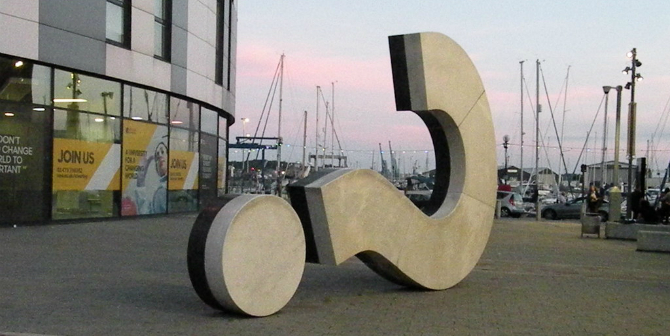 What explains Brexit? The question will keep many academics happily employed for years, writes Kevin O’Rourke (Oxford). His book, A Short History of Brexit: from Brentry to Backstop, attempts to provide an answer as the UK approaches the end of the Article 50 timeline.
What explains Brexit? The question will keep many academics happily employed for years, writes Kevin O’Rourke (Oxford). His book, A Short History of Brexit: from Brentry to Backstop, attempts to provide an answer as the UK approaches the end of the Article 50 timeline.
The British traditionally valued the economic opportunities afforded by Europe, but were much less enthusiastic about the supranational ambitions of the European Communities. And when the European Communities made way for the European Union, a Conservative Party civil war erupted. But Brexit was not inevitable: Leave only won by a small majority.
 © Copyright Keith Edkins and licensed for reuse under this Creative Commons Licence
© Copyright Keith Edkins and licensed for reuse under this Creative Commons Licence
One important distinction is between structural explanations that emphasize the deep underlying roots of the phenomenon, and explanations emphasizing the roles of chance and contingency. Another important distinction is between explanations focused solely on the United Kingdom, and explanations that view Brexit as part of a bigger story. As we know, 2016 was marked not only by the UK referendum but also by the election of Donald Trump in the United States. The following year saw an uncomfortably strong showing for the French National Front, which made it into the second round of the presidential election, and the arrival to power (albeit as part of a coalition) of the far- right FPÖ (Freedom Party of Austria) in Vienna. In 2018 a populist government was elected in Italy. There are strong populist parties elsewhere in Western Europe, and populist governments in Hungary and Poland. When you see common trends of this sort in many countries a common explanation seems in order. What form might such a common explanation take?
 There is a raging debate today in both Britain and the United States regarding whether Brexit and Trump reflect ‘economics’ or ‘culture’. For some, both phenomena are the product of globalization, or technological change, or other impersonal economic forces that are damaging vulnerable communities. For others, they are the product of racism, xenophobia, nationalism and other forms of extreme cultural conservatism. The question of whether economics or culture explains these two watershed political events is in many respects an ideological one. Some on the left are reluctant to admit that either Brexit or Trump might have an economic explanation, for fear of justifying those who voted for them. Some on the right are happy to parade their solidarity with those who have been left behind, and to portray the political upsets of 2016 as a victory for the common man, although neither the UK Conservatives nor the US Republicans have traditionally distinguished themselves by their concern for the poor.
There is a raging debate today in both Britain and the United States regarding whether Brexit and Trump reflect ‘economics’ or ‘culture’. For some, both phenomena are the product of globalization, or technological change, or other impersonal economic forces that are damaging vulnerable communities. For others, they are the product of racism, xenophobia, nationalism and other forms of extreme cultural conservatism. The question of whether economics or culture explains these two watershed political events is in many respects an ideological one. Some on the left are reluctant to admit that either Brexit or Trump might have an economic explanation, for fear of justifying those who voted for them. Some on the right are happy to parade their solidarity with those who have been left behind, and to portray the political upsets of 2016 as a victory for the common man, although neither the UK Conservatives nor the US Republicans have traditionally distinguished themselves by their concern for the poor.
People often assume that economic explanations of voting behaviour must imply rational behaviour, but that isn’t so. To be sure, our hypothetical rustbelt voter is voting in his or her own best economic interests, which is what economists tend to define as ‘rational’ behaviour. But what about a hypothetical British voter supporting Brexit because of Conservative Party austerity? It would be difficult to argue that this wasn’t an economic reason to vote for Brexit, but it would hardly be a rational one, given that Osborne’s austerity policies had little or nothing to do with Europe. The UK is not a member of European Monetary Union, nor is it bound by the European Fiscal Compact, nor are the avoidance of excessive deficits and debt and the associated numerical fiscal rules mandated by the Stability and Growth Pact directly binding upon it (more UK opt-outs). Like Denis Healey’s bullocks, George Osborne’s austerity was Made in Britain. If our hypothetical voter supported Brexit because he was unhappy with austerity, he was aiming at the wrong target. If I were teaching Brexit in 50 years’ time, this is probably how I would introduce the subject.
My students would then write essays debating whether the causes of Brexit were cultural or economic, British or international, rational or irrational, structural or contingent. These distinctions make pedagogical sense, and they help in understanding what is a complex social phenomenon. But my guess is that, having gone through all the arguments, and assessed all the empirical evidence, and read the authoritative histories of Brexit that would have been written at that point, the conclusion would be that Brexit was complicated, and that all of the reasons mentioned above mattered. Because that is nearly always the conclusion that you reach in questions such as this one.
This is an edited extract from A Short History of Brexit: from Brentry to Backstop by Kevin O’Rourke, Published by Pelican 31/01/2019 (£20.00). It represents the views of the author and not those of the Brexit blog, nor the LSE.
Kevin O’Rourke is Chichele Professor of Economic History at All Souls College, University of Oxford.







2 Comments